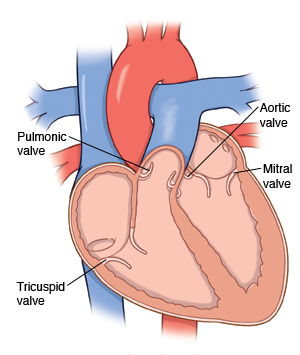A heart murmur is an extra sound that blood makes as it moves through structures in the heart. A heart murmur may mean that there's an abnormality of the heart or one of the structures in the heart. In most cases, a murmur is completely harmless and a normal finding. In some cases, murmurs may mean that there's a more serious problem. This will need further investigation and intervention. Most children will have a heart murmur at some time in their life. These murmurs come and go during childhood. They don’t typically affect the child’s health. As your child gets older, the murmurs may go away on their own. These are called benign or functional murmurs. Some medical conditions, such as viral infections, anemia, and dehydration, may lead to a murmur that goes away on its own and is due to an acute illness.
Sometimes a heart murmur is a sign of a problem in the heart. If your child's doctor thinks that this is the case, your child will be referred to a heart specialist (pediatric cardiologist). Your child will have special tests. These may include:
-
ECG. This looks at the electric pattern of the heart.
-
Pulse oximetry. This shows how much oxygen is in your child’s blood.
-
Chest X-ray. This gives an image of the heart and lungs.
-
Echocardiogram. This test is like an ultrasound of the heart.
-
Cardiovascular MRI. This uses powerful magnets, radio waves, and a computer to make detailed pictures of the inside of the body. This is becoming more popular because it makes better pictures than other methods.
A heart murmur may be caused by a congenital heart defect (CHD). Babies born with CHD may have symptoms at birth. Others may have symptoms later in childhood or as teens. Others may never have any symptoms at all.
These are two common types of CHD that may cause a murmur to be heard:
-
A hole in the wall of the heart that divides either the two bottom chambers (ventricles) of the heart or the two top chambers (atria)
-
A narrowed or leaky heart valve between the different chambers of the heart
A hole in the wall of the heart that divides the two bottom or two top chambers of the heart may close on its own as the child grows older. This depends on where it is located. Sometimes the hole may be so small that it doesn’t cause any problem. Sometimes a child may need surgery to fix a larger hole. And a defect (a narrow or leaky valve) in one or more of the heart valves may need medicine, a catheter procedure, or surgery.
Home care
Follow these guidelines when caring for your child at home:
-
Benign heart murmurs don’t need any special care or treatment.
-
If medicine was prescribed, have your child take it exactly as directed.
Follow-up care
Follow up with your child's doctor, or as advised.
When to get medical advice
Contact your child’s doctor right away if any of these occur in a newborn or baby:
-
Trouble feeding
-
Doesn’t gain weight normally
Call your child’s doctor right away if any of these occur in a child or teen:
-
Tiredness or trouble exercising
-
Trouble gaining weight
-
Leg swelling
Call 911
Call
-
Fast or irregular breathing
-
Blue lips
-
Lasting or abnormal blue legs or feet
-
Passing out or loss of consciousness
Call
-
Chest pain
-
Trouble breathing
-
A fast heartbeat
-
Passing out or loss of consciousness
Featured in


